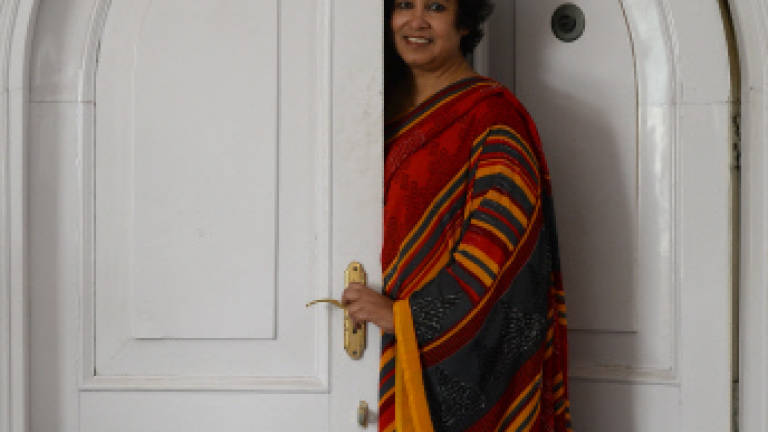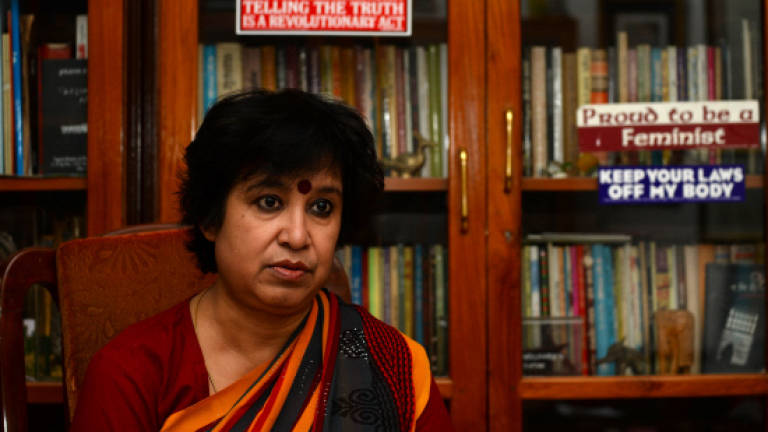Exiled writer Nasreen fears for Bangladesh's future


HAVING herself been the subject of fatwas and forced into exile by fundamentalist critics of her writing, Taslima Nasreen despairs at the wave of assassinations of secular bloggers in her native Bangladesh.
"You know Islamisation started in Bangladesh in the 1980s and in the 80s I was very worried," recalls the prize-winning poet and novelist in an interview with AFP in New Delhi.
"I wrote about Islamic fundamentalists. I said that they should not go unopposed or they will destroy our society, that's exactly what's happened now."
It's 22 years since Nasreen last set foot in Bangladesh, having been forced to flee in fear of her life after tens of thousands of Islamists took to the streets to denounce her writing.
Her novels and essays had brought her no shortage of enemies and she upset the government by railing against rights abuses and the treatment of women. She infuriated Islamists with her fiercely pro-secular views.
She was feted abroad, winning the European parliament's Sakharov Prize for Freedom of Thought in 1994, but the government back home filed a case against her for hurting religious sentiment.
After three separate fatwas calling for her execution were issued, Nasreen fled first to Europe before moving to Bangladesh's giant neighbour India.
Her plight is all too familiar to a new generation of secular writers whose blogs criticising fundamentalism have been met with fury by Islamist groups.
Dozens have either been murdered with machetes, gone into hiding or fled with their families to Europe and the United States.
No one has been convicted of any of the attacks although some suspects have been killed during raids by the security forces.
Bangladesh, which gained its independence in 1971 after winning a war of secession against Pakistan, is an officially secular nation.
But Nasreen says Prime Minister Sheikh Hasina's government has made the same mistake as her predecessors by failing to stand firm against hardliners who want the country to be defined by religion.
"I am very worried. Bangladesh was born as a secular state but now it's a kind of fundamentalist state," she said.
"Islamic fundamentalists are very powerful, they can kill anyone if they want.
"And because those atheist bloggers criticise Islam – they criticise other religions too – but because they criticised Islam they were hacked to death and the government didn't take any action against those killers," she added.
Living with fear
As someone who lives round-the-clock with protection, Nasreen says it's important not to allow oneself to be overwhelmed by fear.
"I think I've got used to it, you have to," she said inside her small apartment, armed guards stationed outside.
"Of course every time a fatwa is issued I get shocked, I get sad, I get scared and then you know you have to live your every day life.
"You cannot think of death all the time, then it's not a living. If I think of death all the time then I would not have been able to write so many books."
Since her first collection of poetry came out in 1982, Nasreen has had more than 40 books published.
Arguably her most famous work was the 1993 novel Lajja (Bengali for Shame) which was about the persecution of a Hindu family living in Bangladesh, where more than 90% of the population is Muslim.
Nasreen's latest book Exile is a memoir about how she was hounded out of the Indian state of West Bengal a decade ago following protests by Muslim groups who tried to force her out of the country for good.
She remains effectively persona non grata in West Bengal and her enmity for her critics is as sharp as ever.
"Who are they to decide who can stay in India and who cannot? ... Those people committed a crime but you are punishing me for no fault of mine," she says animatedly on her rocking chair.
"They issued a fatwa, put a price on my head – which is illegal in India – but nobody was punished for that. I was punished for that, the victim was punished."
Nasreen's home is dotted with stickers and banners with slogans of the causes close to her heart, such as "Proud To Be A Feminist" and "Atheism Cures Religious Terrorism".
A book of cartoons from the French satirical magazine Charlie Hebdo is displayed prominently on her coffee table.
Right to offend
Twelve people were shot dead in Charlie Hebdo's offices in January last year by Islamist gunmen who had taken offence to cartoons depicting the Prophet Muhammad.
Nasreen argues the right to offend is a fundamental part of freedom of expression.
"Many of my books, people say they hurt their religious feelings," she said.
"But I think that if we believe in freedom of expression then we should believe also that everybody should have the right to express their opinions and everybody has the right to offend others and nobody has the right to live their entire life without being offended.
"Freedom of expression cannot exist without the right to offend." — AFP